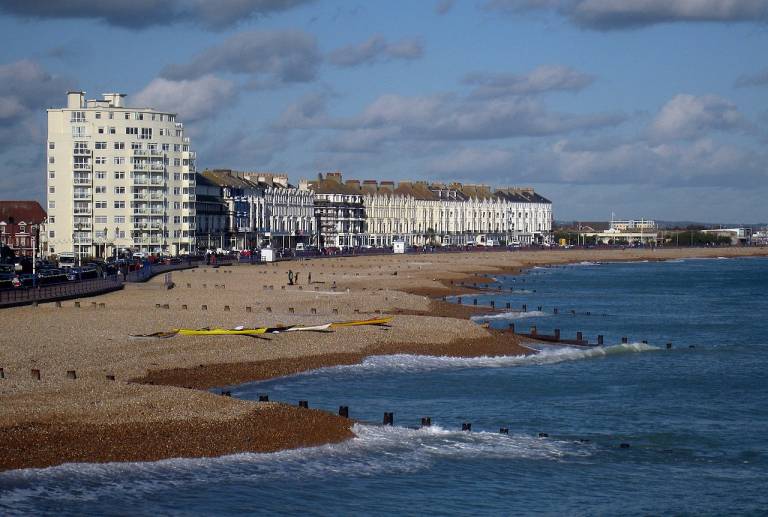Opinion: Exploring the Spatial Intersections of Inequality
6 May 2019
Dr Lucy Natarajan discusses how geography is a recurring component in the analysis of most socio-economic measures - but understanding inequality ‘spatially’ is not simply a matter of identifying the locations of privilege and deprivation.

Dr Lucy Natarajan - Research Associate, Bartlett School of Planning, UCL
The task undertaken by UCL Grand Challenges' Exploring Inequalities project, of bringing together research and insights on inequalities, is enormously challenging but very much needed. As previous opinion pieces in this series attest, it comes after years of growth in inequalities. The work is particularly timely for the UK, as it comes at a point when governance actors are seeking the means to rise to the challenge. The UK 2070 Commission, an inquiry into spatial inequalities led by Lord Kerslake, is the most notable example. UCL’s Bartlett School of Planning is helping the Commission with new research this year.
The significance of the spatial angle on inequality, as laid out in the UK 2070 Commission’s Summary Prospectus, is of enormous relevance to the Exploring Inequalities initiative. Geography is a recurring component in the analysis of most socio-economic measures - but understanding inequality ‘spatially’ is not simply a matter of identifying the locations of privilege and deprivation. Spatial analysis adds depth to researching societal problems of the type UCL terms ‘Grand Challenges’. Societal problems are in essence ‘shared issues’ and therefore geographical analyses are needed if we are to articulate how such problems are unequal within a nation, or for that matter, globally. Spatial analyses articulate problems from the perspective of a ‘united country’ and consequently also help determine how to respond.
Take the example of inequality in the use of antidepressants. The latest evidence is that an increasing cohort of people depends on these medications as a means to dealing with mental health disorders such as depression and anxiety. It has been argued this trend relates to increasing uncertainties around Brexit, while others question whether there are (inappropriate) changes in prescribing habits. More importantly here, it is generally agreed that the quality of National Health Service provision differs vastly by location in a type of postcode lottery, which reframes this problem of health inequality into a matter of health service inequality.
However, when the use of antidepressants is re-considered as an explicitly place-based issue, the narrative changes dramatically. What matters then, are structural economic problems that underlie medical conditions such as depression and anxiety. As O’Connor reports, the doctors on the front line prescribing the drugs recognize this only too well, and report that they are diagnosing ‘shit-life syndrome’ - that is a direct result of low quality of life combined with a lack of hope of anything changing in the area. This creates a vicious circle. In other words, inequalities in mental health (as highlighted by changing levels of antidepressants) are believed to result from long term socio-economic disadvantage in certain towns and cities. They also contribute to ongoing disadvantages.
From the antidepressant example, it is clear that in places of disadvantage those dealing with the problem believe it results from or is at very least compounded by fundamental spatial inequality. Their actions are not necessarily designed to treat inequality but to cope with it. This is an important observation and points to a further significant line of inquiry. We do not argue that spatiality is the only important angle on inequality that the UK2070 Commission needs to assess. Far from it. Places may experience disadvantages in a variety of ways and it is vital to understand all the dimensions of socio-economic problems, across cultural, legal, and demographic angles. This is why, as part of the work to support the Commission, we are seeking to understand the diverse experiences and perspectives on inequalities in the UK.
In May 2019, I will therefore be running a series of discursive events to support the work of the UK2070 Commission and the mission of better understanding spatial inequalities. This new research will be conducted using focus groups to deliberate the experiences and aspirations of voluntary and community groups from around the UK in relation to inequalities. The work aims to uncover differences in approaches to inequality and explore the range of outlooks on the same problem – socio-economic inequality - across the UK. The work will be assisted by three researchers, Elisabeta Ilie, Sonam Gordhan, and Hyunji Cho. Like any study of its kind, the findings are not expected to provide a full picture of all perspectives. Rather, the value of the work will lie in identifying a range of prominent and significant differences in how those who are working on the ground encounter and approach the realities of spatial inequalities.
By June, the focus group team will seek to share the emerging findings and will present the work to the UK2070 Commission and its partners for consideration. Exploring both the spatial intersections of inequality, and the diverse outlooks on them will help to live up to the enormity of the task of synthesizing what is known about social injustice. It is a task that is needed now more than ever.
For more information, analysis and updates visit the UK2070 website or contact lucy.natarajan@ucl.ac.uk.

Image 1: Eastbourne Beach Looking North-East from the pier (Source: Oast House Archive via Wikipedia, CC BY-SA 2.0)
Image 2: Our future (Source: via Pixabay)
> More on Exploring Inequalities
 Close
Close

